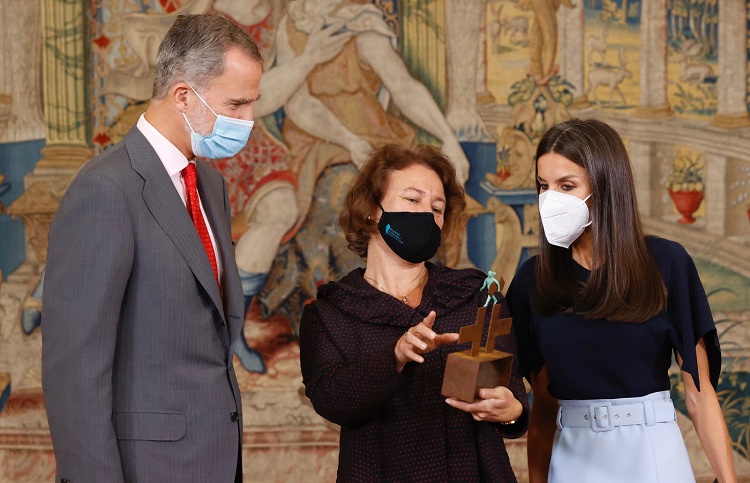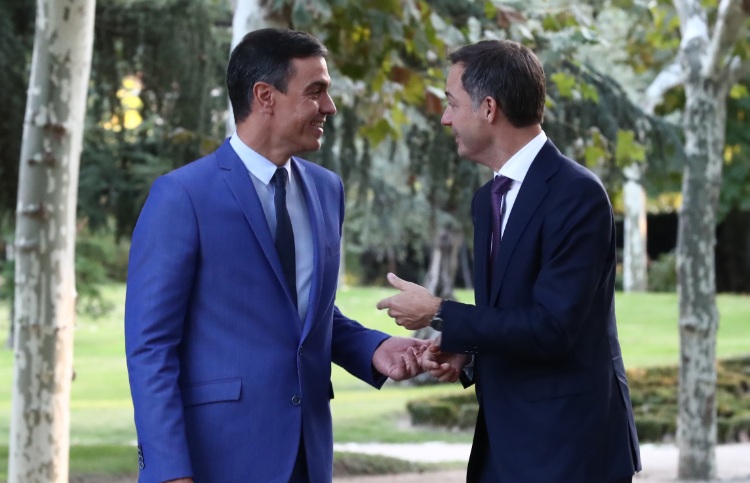The Dipilomat
The King and Queen yesterday presided over the annual meeting of the Board of Trustees of the Instituto Cervantes, whose director, Luis García Montero, announced during the event that the institution faces, on the thirtieth anniversary of its founding, four immediate priorities to promote “the prestige of Spanish in the world”: Sub-Saharan Africa, the United States, Asia and the digital transformation of culture.
The meeting, held at the Royal Palace of El Pardo (Madrid) and which addressed the balance of the 2020-2021 academic year and the objectives and forecasts for the new academic year, was attended, in addition to King Philip VI and Queen Letizia, by the President of the Government, Pedro Sánchez (executive president of the Board of Trustees); the Ministers of Education, Pilar Alegría, and Culture, Miquel Iceta, and the Secretary of State for International Cooperation and president of the Institute’s Board of Trustees, Pilar Cancela. The Minister of Foreign Affairs, José Manuel Albares, is an ex officio member of the Board of Trustees, but was unable to attend because he was in Luxembourg for the EU Foreign Affairs Council.
During the event, the King said that “the Instituto Cervantes is celebrating its 30th anniversary and it is doing so, as we have seen, as you can see, in excellent shape, with new plans in all areas and with newborn enthusiasm”. He also stressed “once again the commitment of the Crown to an institution so closely linked to our democratic Spain” and recalled that “the first solo public act of the Princess of Asturias” was “precisely opening the celebrations of this thirtieth anniversary of its founding”.
During the meeting, the Ñ Award was also presented to Barbara Fuchs, professor at the University of California, writer and promoter of an initiative that promotes knowledge of the Spanish Golden Age. The award, created in 2021 by the Instituto Cervantes, will recognize each year a personality who stands out for his or her work in promoting the Spanish language around the world.
García Montero: Dakar, Los Angeles, Seoul and digital transformation
For his part, Luis García Montero stated during the meeting that the thirtieth anniversary has coincided with a pandemic to which it was necessary to “respond quickly and in order” and which, in the 2020/2021 academic year, caused “the forced closure of centers and examination spaces”. However, he expressed his “satisfaction” for “having found the appropriate responses to continue” with the activities of the Institute, examples of which were the 14,428 Spanish courses and the 116,569 enrollments in the last academic year, “only 14% less than in the previous academic year”.
“Taking stock of 30 years of the Instituto Cervantes means thinking seriously about its next 30 years” and, in this context, “there are four priorities, four needs to respond to for the prestige of Spanish in the world: sub-Saharan Africa, the United States, Asia and the digital transformation of culture that we are experiencing,” the director continued.
“Thanks to the budget approved for 2021 we launched our center in Dakar,” whose works were inaugurated during the visit of President Pedro Sánchez to Senegal and which “will be completed in December of this year,” he announced. The second priority, the United States, will materialize with the opening of a center in the city of Los Angeles, approved by the Council of Ministers. “We have already located and rented a symbolic building in Hollywood” and, “if the budgets for the year 2022 are approved, we will be able to have the necessary staff and resources to have the Cervantes in Los Angeles at full capacity next year,” he assured.
As for the third challenge, Asia will host, “if the budgets are approved,” a new center in Seoul, where there is already an Aula Cervantes. “Asia today is an economic and strategic power that demands Spanish as a second language,” he said. “The center in New Delhi is the one with the largest number of enrollments in our network, so we are already studying the possible expansion to other parts of India,” he announced.
“The last challenge of the Institute that I want to refer to, as those responsible for the teaching of Spanish and the defense and dissemination of Spanish and Spanish-language culture in the world, is that of digital transformation,” García Montero said. “The pandemic has accelerated years of work in the search for and regulation of the use of digital channels for our work, a challenge that is not only technological, nor a hasty business party in search of recovery funds, but the most important point of cultural reflection for today’s democratic societies,” he concluded.







